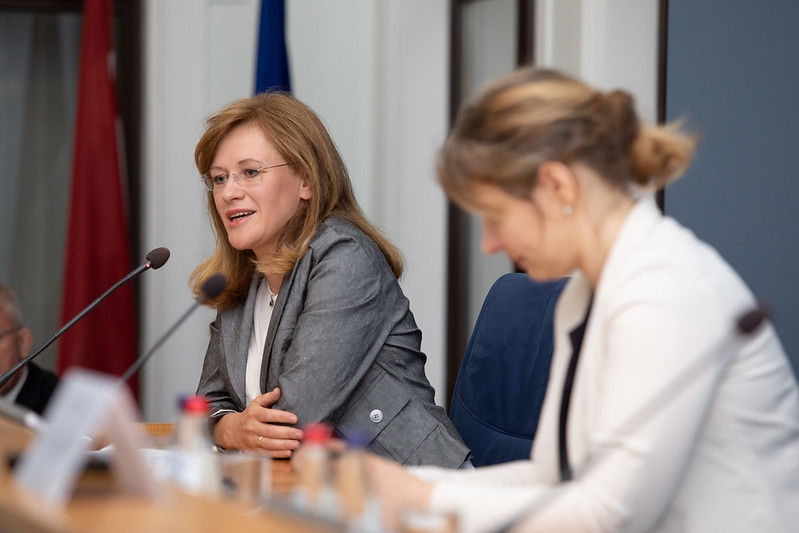On 6 July 2020, the Ministry of Foreign Affairs hosted a presentation of the most recent research reports by the Centre for the Diaspora and Migration Studies of the University of Latvia (LU DMPC), with participation of their authors, Associated Professor Inta Mieriņa and Professor Mihails Hazans. The event was opened by the Parliamentary Secretary of the Ministry of Foreign Affairs, Zanda Kalniņa-Lukaševica.
The Parliamentary Secretary noted that one of the studies has been created to more precisely assess the size of the diaspora and the scale of migration, which serves as a point of reference for the development of policy instruments. The research proves, said Zanda Kalniņa-Lukaševica, that we are broadly represented across the globe in terms of human resources. Every member of the diaspora has their own value and by networking more effectively the diaspora has the potential to strengthen the sense of belonging to Latvia thereby increasing the possibility of the return of emigrants.”
Zanda Kalniņa-Lukaševica underlined that the latest research in the field of the diaspora will feed into the development of the Diaspora Action Plan for 2021–2023. To agree on the plan, decisions must be taken on priorities depending on the needs of each community – be it support for the diaspora organisations or promoting the learning of Latvian among young people and children. Issues which have been increasing in importance are business stimulation measures, creating links and contact-building between the business communities of the diaspora and in Latvia, and networking among scientists, thereby promoting experience-sharing among scientists of Latvian descent working in research institutions abroad.
Under the leadership of the Director of the Centre for the Diaspora and Migration Studies of the University of Latvia (LU DMPC), Prof. Inta Mieriņa, the study titled “Diaspora Networking: The Practice of Involvement and Cooperation Opportunities” explored how actively Latvians living abroad are engaged in networking and the life of the diaspora – diaspora organisations, amateur art groups, voluntary associations, and events targeting the diaspora, for instance, concerts and celebrations. The study aims at offering well-grounded information and recommendations for more effective networking of the Latvian diaspora and providing an answer to the question: “What would promote a broader engagement of diaspora members in life of the diaspora?”
According to the author of the study, this research is highly important because cohesion among the diaspora and sustained contacts through involvement in diaspora events, organisations and groups is the basis for a strong Latvian community abroad.
The authors have found that almost only Latvians are currently participating in the diaspora organisations and events, and they are considerably less popular among young people. The authors also point out that the ability of the diaspora organisations to retain their relevance and popularity among the younger generation of emigrants, the way it was with the Latvians in exile and their descendants, depends on whether those organisations are able to adapt to the new circumstances and demands.
Prof. Mihails Hazans headed a study titled, “Estimate of the Size of the Diaspora”, which offers a review and evaluation of current methodologies to estimate the scale of emigration and remigration (return of emigrants). It has been estimated that the number of Latvian nationals and former Latvian nationals abroad at the beginning of 2019 reached 292 thousand and 300 thousand at the beginning of 2020. As for ethnic Latvians or descendants of Latvia-born persons in the USA, Australia, Canada and some European countries, the estimated number of the Latvian diaspora for 2019 has increased depending on the data used.
The study has also estimated the scale of remigration. As pointed out by the author, this depends considerably on the scope of the term “remigrant” (returning emigrants), that is, how many years they spent abroad and for how long after their return a person is considered a remigrant. In Latvia in 2017, for instance, there were 30 thousand remigrants, while in 2018, there were 34 thousand remigrants with a four-year work experience acquired abroad. From 2013 to 2018, an estimated 10 to 11 thousand remigrants who had been working abroad (regardless of the length of their stay) returned to Latvia annually.
In total, 53 thousand people returned to Latvia as remigrants from 2008 to 2018, with experience gained while working abroad over for the past 15 months, and 117 thousand persons with the experience of the previous four years of working abroad. At the end of 2019, there were 145 thousand remigrants in Latvia, aged 18 to 74 years old, who had worked in a foreign country for at least 6 months over the past decade (2010–2019).
Research reports are available here in an electronic form (in Latvian).
For further information: LU DMPC Director Inta Mieriņa, tel. +371 25919309





